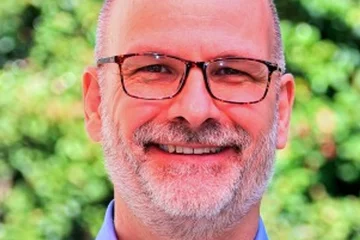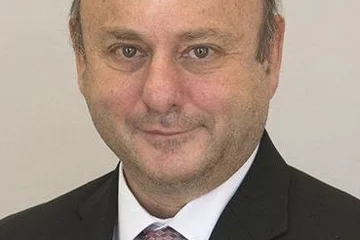What Is a Psychiatrist?
Faculty Spotlight

A Day in the Life of Erica Lubliner, MD, Psychiatrist at UCLA Health

Psychiatrists enjoy varied career paths. They can see patients or supervise other practitioners. They can work in clinics, hospitals, or both. Some practice street psychiatry, treating unhoused individuals. Others do research on different treatments and interventions. They can also serve in leadership roles.
“For example, the first Chief Executive Officer (CEO) of Ronald Reagan UCLA Medical Center was a psychiatrist,” says Erica Lubliner, MD, a psychiatrist at UCLA Health.
A day in Dr. Lubliner’s life includes seeing patients in an outpatient setting and directing the Spanish-Speaking Psychosocial Clinic, where she sees patients and also leads a team including psychiatrists, psychologists, and social workers. She also teaches psychiatry residents and interns and is starting a research project of Latinx psychiatric hospitalizations. She also sees patients in her private-practice clinic.
What Does a Psychiatrist Do?
Psychiatrists are trained physicians who specialize in mental health. They evaluate, diagnose, and treat psychiatric disorders according to the American Psychiatric Association’s Diagnostic and Statistical Manual of Mental Disorders. The treatments they offer include medication, therapy, and behavioral interventions. They are vital team members in inpatient and outpatient settings.
Dr. Lubliner evaluates labs, imaging, communicates with other practitioners to collaborate in treatment, and does anything else necessary to support the rest of a patient’s care team.
“Patients come to us because things aren’t working, and they need something to change. We help them create that change, or sometimes they develop an awareness that change needs to happen.”
What she loves most about being a psychiatrist is having an impact on patients and their families.
“You’ll hear me say ‘family’ over and over again, because I love talking to families and getting to the root of problems,” she says, explaining that when patients feel better, their families, and maybe even their communities, feel better too.
“It ripples outward. You’re helping everybody by improving one patient’s life.”
Dr. Lubliner also enjoys helping patients connect the dots between their mind and their body. For example, they might realize a physical complaint goes away when they’re experiencing less stress.
Her biggest challenges involve navigating the structural inequities and social stigmas that make it even harder for some patients to get the care they need. Barriers disproportionately affect patients with different backgrounds, cultures, ethnicities, genders, linguistic abilities, and socioeconomic or immigration statuses.
“The mental health care system needs to be equipped with leaders that can then equip the system to better treat patients. The patient is not the problem. We need to look at the system and see how it’s working.”
Psychiatrist vs Psychologist - What’s the Difference?
Psychiatrists and psychologists are both professionals who specialize in the field of mental health, but they differ in terms of education, training, and practice.
Read Psychologist vs Psychiatrist - What Is the Difference?
How to Become an Psychiatrist
To become a psychiatrist, you must go to medical school, complete residency training in psychiatry, fulfill state licensing requirements, and—optionally—get certified by the American Board of Psychiatry and Neurology.
Dr. Lubliner says some characteristics that make aspiring psychiatrists strong candidates include compassion, for self and for others, a sense of humor, and the ability to manage expectations.
“I was a double major in history and women's studies, both social sciences,” Dr. Lubliner says. “I always had the intention to go to medical school, and I think those disciplines gave me a good foundation.”
The first in her family to become a physician, she admits being intimidated by the medical school requirements and also concerned about the expenses.
“It just took me a while to gain my confidence.”
Psychiatry hadn’t crossed her mind when she started medical school. She considered family medicine and also pediatrics because she liked the idea of helping patients from the beginning of their lifespan.
She didn’t fully grasp what a psychiatrist could accomplish until meeting her role model—someone impacting her community via psychiatry.
“That's when I got excited about it. I realized I could do it every day and also use my education and leadership experiences. I’m also curious and interested in how people feel and why they do things, so it felt like a good match.”
Dr. Lubliner advises students interested in the field to shadow different psychiatrists in different settings.
“If you're under-represented in medicine, get a mentor who is also under-represented in medicine. You’ll get essential advice and perspectives.”
She also offers encouraging words about the benefits that come with practicing psychiatry.
“It’s satisfying to help so many people. You’ll reflect, feel a lot of emotions, develop good strategies to thrive, grow, and laugh a lot. Although you’re focused on patients, you’ll be constantly reflecting on your own life in the best possible way.”
How Much Do Psychiatrists Make?
According to the United States Bureau of Labor Statistics, the median annual psychiatrist salary in the U.S. is $247,350
Mental Health Awareness Month
For Mental Health Awareness Month, Dr. Lubliner wants to break down a few misconceptions about seeking help from a mental-health professional.
Misconception: Mental health problems are different from other health problems.
“Some patients may hesitate to seek care because they think they’re failing personally. They think it’s a weakness, but it’s really a health issue you can get help with.”
Misconception: Psychiatrists are only good at talking.
“We are good at talking, but we’re also skilled clinicians and diagnosticians, we lead teams, we advocate for patients, and get things done.”
Misconception: Patients can handle issues themselves
“We say, ‘Don’t worry alone.’ Ask for help. We psychiatrists have our doors open for all patients no matter what linguistic or cultural barriers they’re facing.”
Help Shape the Future of Mental Health by Joining the UCLA Mental Health Research Registry



